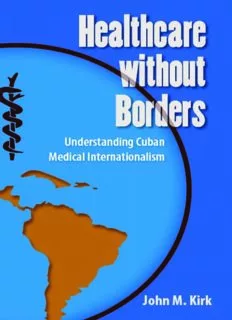
Healthcare without Borders: Understanding Cuban Medical Internationalism PDF
Preview Healthcare without Borders: Understanding Cuban Medical Internationalism
Healthcare without Borders Contemporary Cuba University Press of Florida Florida A&M University, Tallahassee Florida Atlantic University, Boca Raton Florida Gulf Coast University, Ft. Myers Florida International University, Miami Florida State University, Tallahassee New College of Florida, Sarasota University of Central Florida, Orlando University of Florida, Gainesville University of North Florida, Jacksonville University of South Florida, Tampa University of West Florida, Pensacola HealtHcare witHout Borders Understanding Cuban Medical Internationalism John M. Kirk John M. Kirk, series editor University Press of Florida Gainesville · Tallahassee · Tampa · Boca Raton Pensacola · Orlando · Miami · Jacksonville · Ft. Myers · Sarasota Copyright 2015 by John M. Kirk All rights reserved Printed in the United States of America on acid-free paper This book may be available in an electronic edition. 20 19 18 17 16 15 6 5 4 3 2 1 Library of Congress Cataloging-in-Publication Data Kirk, John M., 1951– author. Healthcare without borders : understanding Cuban medical internationalism / by John M. Kirk. pages cm — (Contemporary Cuba) ISBN 978-0-8130-6105-4 1. Medical assistance, Cuban. 2. Medical policy—Cuba. 3. Medical care—Cuba— Methods. 4. Public health—Cuba. 5. International cooperation. I. Title. II. Series: Contemporary Cuba. RA390.C9K58 2015 362.1097291—dc23 2015013773 The University Press of Florida is the scholarly publishing agency for the State University System of Florida, comprising Florida A&M University, Florida Atlantic University, Florida Gulf Coast University, Florida International University, Florida State University, New College of Florida, University of Central Florida, University of Florida, University of North Florida, University of South Florida, and University of West Florida. University Press of Florida 15 Northwest 15th Street Gainesville, FL 32611-2079 http://www.upf.com Contents List of Tables vii Preface ix Acknowledgments xiii Introduction: Setting the Scene 1 1. Origins and Evolution: From “Beggar’s Helper” to a “White-Jacketed Army” 14 2. ELAM, a School for All Nations 42 3. Dealing with the “Handicapped” of ALBA: Setting the Balance Right 68 4. Operación Milagro: Bringing Vision to Millions 96 5. Cuba’s International Disaster Responses: From 1960s Chile to the 2005 Henry Reeve Brigade 118 6. South-South Cooperation in Biotechnology: Medicine for the Masses 139 7. The Cuba-Venezuela Medical Partnership: The Castro-Chávez Dream Lives On 162 8. Cuba’s Role in Haiti: Hurricanes, an Earthquake, and Cholera 189 9. Cuba’s Medical Internationalism in the South Pacific 215 10. The Children of Chernobyl: 25,000 Treated 236 11. Cuba’s Medical Internationalism in El Salvador since Hurricane Ida 253 Conclusion: No Longer the World’s Best-Kept Secret 270 Notes 283 Bibliography 313 Index 341 Tables 1.1. Cuba’s Comprehensive Health Program in 15 African nations, November 1998–June 2004 31 1.2. ELAM enrollment of students from Central America, 2004–2005 33 2.1. Employment status of Haitian ELAM graduates, 2012 51 2.2. Subject material taught at ELAM 56 3.1. Results of disability study in ALBA countries, 2013 94 4.1. Surgical interventions, Operation Miracle, 2004 through May 10, 2013 116 5.1. Cuba’s international disaster response 120 5.2. Impact of the combined Cuban healthcare program in Guatemala, 1998–2009 137 8.1. Selected statistics on the impact of Cuban medical cooperation in Haiti, December 1998–May 2007 197 8.2. Selected infectious diseases in Haiti, February 2007 and February 2008 197 8.3. Initial response to cholera outbreak by Cuban-led medical team in Haiti 206 11.1. Form used by Cuban personnel to evaluate health profiles in areas affected by natural disasters 258 11.2. Accumulated data on the work of the Cuban medical brigade in El Salvador, November 13, 2009, through February 22, 2010 259 11.3. Principal medical conditions of patients seen by Cuban medical brigade 260 C.1. Cuban medical internationalism statistics presented by the Unidad Central de Colaboración Médica in Havana, October 16, 2013 274 Preface For such a small nation, the number of doctors and nurses that Cuba is sending, as well as the speed with which the country has responded, is really extraordinary. Margaret Chan, director general, World Health Organization, September 12, 2014 In the fall of 2014, a deadly outbreak of Ebola swept through the West Af- rican countries of Liberia, Guinea-Conakry, and Sierra Leone. By mid- September, 5,000 people had been infected, over half of whom died, and just four months later the number of patients had risen to over 20,000, with more than 8,000 deaths recorded. Predictions about the total num- ber of cases ranged from 20,000 to hundreds of thousands. Faced with an impending disaster, Ban Ki-moon, secretary-general of the United Nations and Dr. Margaret Chan, director general of the World Health Organization (WHO), appealed to the international community for help and stressed the need for doctors and nurses above all else. The first country to offer support was Cuba. At that time the WHO had 170 medical staff working on this campaign but desperately needed more. (They had deployed some 500 specialists, but rotated them monthly due to the dangerous conditions, so that at any given time only about a third would be working in field.) Some interna- tional charities and NGOs had smaller numbers of medical staff working for short periods in West Africa, but others had withdrawn their members because of the dangers faced, and many healthcare workers had died as a result of infection. Some countries sent field hospitals and bedding, food, and medicine, while the United States provided extensive military support and others donated money. It was clear, though, that the greatest need was for medical personnel—a challenge ignored by most industrialized nations. Cuba responded to the appeal within days by offering to send to Sierra Leone 103 nurses and 62 doctors, all of whom had volunteered to help. This was the first contribution of healthcare personnel by any country, and it
Description: